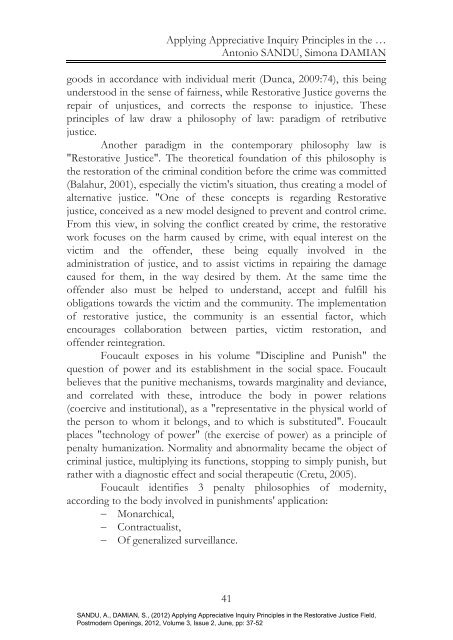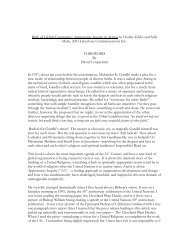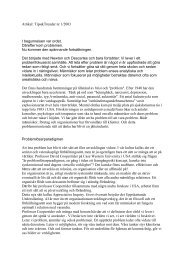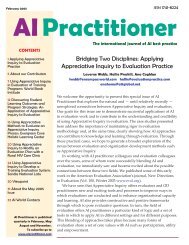Applying Appreciative Inquiry Principles in the Restorative Justice ...
Applying Appreciative Inquiry Principles in the Restorative Justice ...
Applying Appreciative Inquiry Principles in the Restorative Justice ...
You also want an ePaper? Increase the reach of your titles
YUMPU automatically turns print PDFs into web optimized ePapers that Google loves.
<strong>Apply<strong>in</strong>g</strong> <strong>Appreciative</strong> <strong>Inquiry</strong> <strong>Pr<strong>in</strong>ciples</strong> <strong>in</strong> <strong>the</strong> …<br />
Antonio SANDU, Simona DAMIAN<br />
goods <strong>in</strong> accordance with <strong>in</strong>dividual merit (Dunca, 2009:74), this be<strong>in</strong>g<br />
understood <strong>in</strong> <strong>the</strong> sense of fairness, while <strong>Restorative</strong> <strong>Justice</strong> governs <strong>the</strong><br />
repair of unjustices, and corrects <strong>the</strong> response to <strong>in</strong>justice. These<br />
pr<strong>in</strong>ciples of law draw a philosophy of law: paradigm of retributive<br />
justice.<br />
Ano<strong>the</strong>r paradigm <strong>in</strong> <strong>the</strong> contemporary philosophy law is<br />
"<strong>Restorative</strong> <strong>Justice</strong>". The <strong>the</strong>oretical foundation of this philosophy is<br />
<strong>the</strong> restoration of <strong>the</strong> crim<strong>in</strong>al condition before <strong>the</strong> crime was committed<br />
(Balahur, 2001), especially <strong>the</strong> victim's situation, thus creat<strong>in</strong>g a model of<br />
alternative justice. "One of <strong>the</strong>se concepts is regard<strong>in</strong>g <strong>Restorative</strong><br />
justice, conceived as a new model designed to prevent and control crime.<br />
From this view, <strong>in</strong> solv<strong>in</strong>g <strong>the</strong> conflict created by crime, <strong>the</strong> restorative<br />
work focuses on <strong>the</strong> harm caused by crime, with equal <strong>in</strong>terest on <strong>the</strong><br />
victim and <strong>the</strong> offender, <strong>the</strong>se be<strong>in</strong>g equally <strong>in</strong>volved <strong>in</strong> <strong>the</strong><br />
adm<strong>in</strong>istration of justice, and to assist victims <strong>in</strong> repair<strong>in</strong>g <strong>the</strong> damage<br />
caused for <strong>the</strong>m, <strong>in</strong> <strong>the</strong> way desired by <strong>the</strong>m. At <strong>the</strong> same time <strong>the</strong><br />
offender also must be helped to understand, accept and fulfill his<br />
obligations towards <strong>the</strong> victim and <strong>the</strong> community. The implementation<br />
of restorative justice, <strong>the</strong> community is an essential factor, which<br />
encourages collaboration between parties, victim restoration, and<br />
offender re<strong>in</strong>tegration.<br />
Foucault exposes <strong>in</strong> his volume "Discipl<strong>in</strong>e and Punish" <strong>the</strong><br />
question of power and its establishment <strong>in</strong> <strong>the</strong> social space. Foucault<br />
believes that <strong>the</strong> punitive mechanisms, towards marg<strong>in</strong>ality and deviance,<br />
and correlated with <strong>the</strong>se, <strong>in</strong>troduce <strong>the</strong> body <strong>in</strong> power relations<br />
(coercive and <strong>in</strong>stitutional), as a "representative <strong>in</strong> <strong>the</strong> physical world of<br />
<strong>the</strong> person to whom it belongs, and to which is substituted". Foucault<br />
places "technology of power" (<strong>the</strong> exercise of power) as a pr<strong>in</strong>ciple of<br />
penalty humanization. Normality and abnormality became <strong>the</strong> object of<br />
crim<strong>in</strong>al justice, multiply<strong>in</strong>g its functions, stopp<strong>in</strong>g to simply punish, but<br />
ra<strong>the</strong>r with a diagnostic effect and social <strong>the</strong>rapeutic (Cretu, 2005).<br />
Foucault identifies 3 penalty philosophies of modernity,<br />
accord<strong>in</strong>g to <strong>the</strong> body <strong>in</strong>volved <strong>in</strong> punishments' application:<br />
Monarchical,<br />
Contractualist,<br />
Of generalized surveillance.<br />
41<br />
SANDU, A., DAMIAN, S., (2012) <strong>Apply<strong>in</strong>g</strong> <strong>Appreciative</strong> <strong>Inquiry</strong> <strong>Pr<strong>in</strong>ciples</strong> <strong>in</strong> <strong>the</strong> <strong>Restorative</strong> <strong>Justice</strong> Field,<br />
Postmodern Open<strong>in</strong>gs, 2012, Volume 3, Issue 2, June, pp: 37-52






